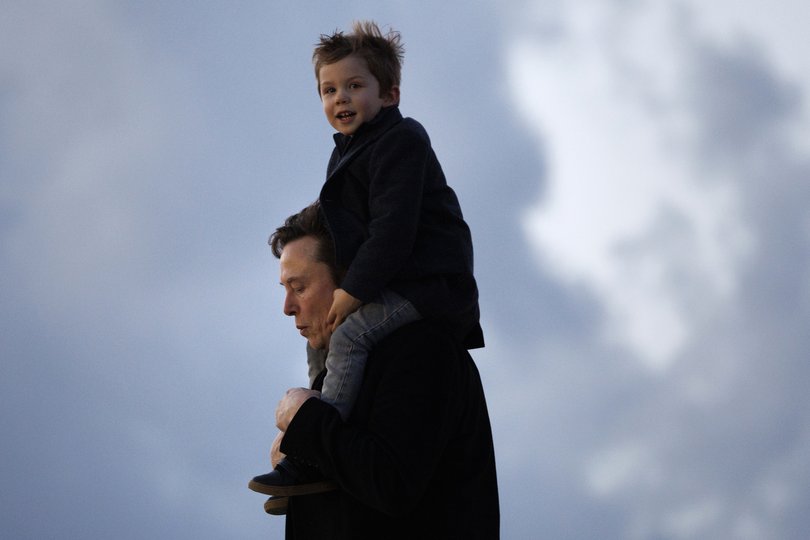The techno-futuristic philosophy behind Elon Musk’s mania
From the White House to Mars, the tech billionaire has his sights set on the long term.

As Elon Musk prepared to make a less-than-triumphant exit from Washington, he told Fox News host Jesse Watters a few weeks ago that his rampage through the bureaucracy had made “significant progress” in cutting waste and fraud. But there was no hiding that the man whose rockets can gracefully return to Earth standing tall on their launchpads had made a bit of a crash landing.
His projected cut of $2 trillion from the federal budget had shrunk on paper, at that point, to $165 billion. Tesla stock took a nosedive along with his personal wealth and popularity. And, as he rewrote Silicon Valley’s mantra into “move fast, break things and get out of town,” no one was urging him to stay.
Prompted by Watters, Musk shifted the interview seamlessly from eradicating waste to another obsession: the looming eradication of life on Earth. “The sun is gradually expanding, so we do at some point need to be a multiplanetary civilisation because Earth will be incinerated,” Musk said.
Sign up to The Nightly's newsletters.
Get the first look at the digital newspaper, curated daily stories and breaking headlines delivered to your inbox.
By continuing you agree to our Terms and Privacy Policy.Say what you will about Musk, the man thinks ahead.
Over the past couple decades, Musk has devoted himself to three grand engineering projects, all with the long-term mission of sustaining humanity far into the future. The goal of his rocket company SpaceX is to establish a city on Mars. Tesla is accelerating the transition to sustainable energy, autonomous vehicles and humanoid robots. Neuralink aims to eventually wire artificial intelligence into human brains.
“The guy is our Einstein,” JPMorgan Chase & Co. CEO Jamie Dimon said two days after President Donald Trump’s inauguration.
That was before Musk etched a new image for himself — a man all in black with dark sunglasses, strutting before a roaring crowd, punching the air with a chain saw.
Musk embraced Trump after a MAGA conversion, motivated by his fear that regulation was choking innovation and his vow to “destroy the woke mind virus” after one of his children underwent a gender transition. But Musk split with the president on tariffs and the budget bill and the billionaire buddies formally fissured Wednesday night. Musk took to his social media network X to thank the president for allowing him to serve and indicated that he was permanently moving on.
Musk’s tumultuous four-month adventure shifted his gaze from the long term to the ultimate short-term arena — politics. The wild ride through the halls of official power perhaps fed his taste for drama, celebrity and the adolescent heroism of comic books and sci-fi.
But there is another strand that runs strong in Musk, a techno-futuristic philosophy that might help explain how the man who has fancied himself Batman on a mission to save humanity could also play the dark jokester — the world’s richest man who gleefully proclaimed the demise of aid for the world’s poorest with a callous quip about how he and his Department of Government Efficiency troops had “spent the weekend feeding USAID into the wood chipper.”
That philosophy emerged from the world Musk now returns to full time, a world of engineers and utilitarian thinkers and tech billionaires, who seem to have designs on everything — past, present and, especially, future.
In 2022, Musk reposted a link to a 2003 paper by Nick Bostrom, a philosopher who was then at Oxford University, with this line: “Likely the most important paper ever written.”
In the paper, titled “Astronomical Waste: The Opportunity Cost of Delayed Technological Development,” Bostrom took a stab at calculating the potential lives lost by delaying the development of technology needed to survive “in the accessible region of the universe” for millions of years. “The potential for over 10 trillion potential human beings is lost for every second of postponement of colonisation of our supercluster,” he wrote.
Such pie-in-the-sky calculations urging the colonising of space might seem like unusual territory for a philosophy professor — even one with advanced degrees in physics and computational neuroscience. But Bostrom is among a group of philosophers and technologists that promotes a strain of thinking clunkily labeled longtermism. It’s a worldview that aligns with — and supports — Musk’s futurist, sometimes fantastical, vision.
Longtermism is deeply entwined with effective altruism, a more widely known movement. Effective altruism, which developed from ideas put forth by philosopher Peter Singer in the early 1970s, argues that well-off people and societies are morally obligated to combat poverty, even far from home. It encourages a strict, utilitarian process for calculating how philanthropy can do the greatest good for the greatest number of people.
The longtermists radically changed the equation by asserting that we have a similar moral obligation to the well-being of our brethren yet to come, those thousands or even millions of years in the future. Of course, there are potentially many, many, many more future people than there are current ones.
So, the case can be made that ensuring the existence of future human civilisation by preparing for species-ending risks such as a massive asteroid strike or global nuclear annihilation outweighs addressing poverty or starvation for a few hundred million current people.
For longtermists, the most pressing threats are often existential, and technology is almost always the cure.
This is Musk’s sweet spot. The focus of so much of his technology — rocketry, humanoid robotics, his tunneling company — is intended to converge on making “human consciousness” multiplanetary, an urgent mission he complains is frustrated by rules and regulators. He calls colonising Mars “life insurance of life collectively.”
“For the first time in the 4 1/2-billion-year history of Earth, it is possible to extend consciousness beyond our home planet,” he said on Joe Rogan’s podcast in February.
“We have to see this as a race against time,” he said.

Musk took his first step toward Mars in 2001 when he donated $5,000 to the Mars Society, which was started by Robert Zubrin, an aerospace engineer who had written the book “The Case for Mars: The Plan to Settle the Red Planet and Why We Must.” The next year, Musk started SpaceX.
Coincidentally or not, this was about the same time Bostrom published a paper titled “Existential Risks: Analysing Human Extinction Scenarios and Related Hazards.” It looked at a range of threats: a meteor strike; global disease; runaway AI; even the admittedly slim possibility that a future society created a simulated reality that we were now unknowingly living in and which could be turned off. Musk has occasionally invoked this “simulation theory.”
Whether or not Musk read the paper, he has echoed Bostrom and other proponents of longtermism, including philosopher William MacAskill. MacAskill became something of a celebrity intellectual among technologists and financiers, to whom he preached an “earning-to-give” approach to philanthropy. Musk touted MacAskill’s 2022 book, “What We Owe the Future,” saying on X that the explication of longtermist thinking is “a close match to my philosophy.”
Not surprisingly, Musk, who did not respond to a request for comment, does not explicitly identify himself with any movement defined by anyone else — or didn’t before falling in with MAGA. Bostrom takes no credit for Musk’s long view, saying in an email, “My impression is that Musk is not a follower of any one particular school of thought but is rather inclined to do his own thinking and to reach his own conclusions.”
But it is unmistakable how frequently Musk warns of existential threats.
Musk is now headed back to the future, claiming he still plans to shoot for Mars next year.
Even Zubrin thinks Musk’s Mars colonisation plan is “nuts.” He wants the United States to pursue Mars for the challenge and for science. And he worries that Musk’s short-term dive into politics has hurt the long-term goal, since the Mars mission might now be seen as a Musk project and become prone to political turbulence.
In February, still deep in the turbulence of Washington, Musk regaled Rogan with tales of waste from the federal budget. Like USAID, which stands for U.S. Agency for International Development, the care and feeding of migrants was a particular DOGE target. It’s plausible that a careful audit could find money poorly spent, but Musk came to a more ominous and more predictable conclusion: He had found a new existential threat.
“We’ve got civilisational suicidal empathy going on,” he told Rogan. “The fundamental weakness of Western civilisation is empathy. The empathy exploit. They are exploiting a bug in Western civilisation, which is the empathy response. And I think empathy is good, but you need to think it through and not just be programmed like a robot.”
This article originally appeared in The New York Times.
© 2025 The New York Times Company
Originally published on The New York Times
